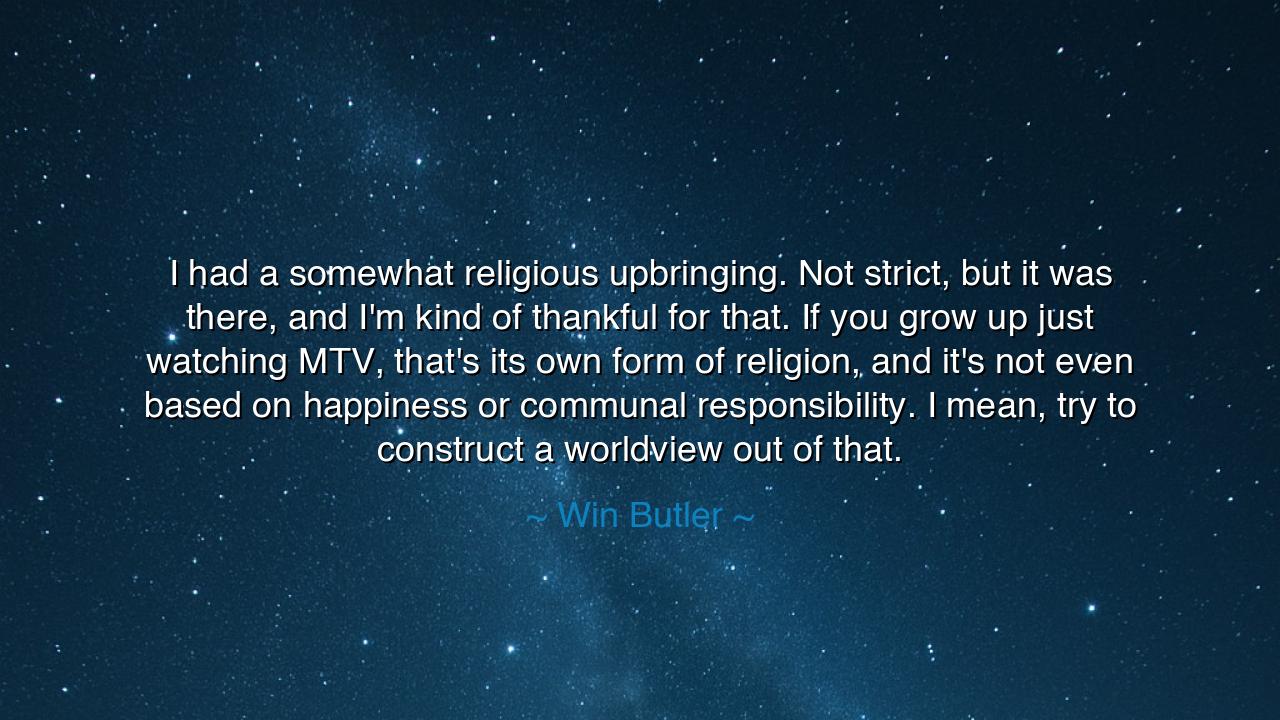
I had a somewhat religious upbringing. Not strict, but it was
I had a somewhat religious upbringing. Not strict, but it was there, and I'm kind of thankful for that. If you grow up just watching MTV, that's its own form of religion, and it's not even based on happiness or communal responsibility. I mean, try to construct a worldview out of that.






In the words of Win Butler, there emerges a reflection that is both personal and universal: “I had a somewhat religious upbringing. Not strict, but it was there, and I’m kind of thankful for that. If you grow up just watching MTV, that’s its own form of religion, and it’s not even based on happiness or communal responsibility. I mean, try to construct a worldview out of that.” These words, spoken in humility, point us toward the eternal question of what foundations shape a life. For every soul builds its existence upon something, whether it be faith, culture, or mere entertainment. Butler proclaims gratitude that his foundation was touched, even lightly, by religion, rather than left to drift in the shallow waters of pop spectacle.
The essence of his words lies in the contrast between a religious upbringing and a culture of pure consumption. Religion, even when not enforced strictly, plants seeds of morality, responsibility, and reverence for something larger than the self. It gives a child a lens through which to view the mysteries of suffering, joy, and purpose. In contrast, a childhood shaped only by the glow of television—what Butler likens to the altar of MTV—offers no enduring foundation. It teaches desire, novelty, and spectacle, but not responsibility, not community, not the pursuit of the eternal.
This truth has echoed throughout the ages. Consider the fall of Rome, when the people, once bound together by duty and reverence for tradition, grew intoxicated by games, feasts, and spectacle. The philosopher Juvenal lamented that the people cared only for “bread and circuses.” With no higher vision to unite them, their worldview crumbled into indulgence, leaving them vulnerable to decay. Butler’s words echo this same warning: when one builds a life upon spectacle alone, one builds upon sand, and the structure cannot endure.
Yet he does not exalt religious strictness, but gives thanks for a measured upbringing, one that gave him enough of a compass to orient his soul without binding him in chains. This balance is itself a wisdom: that the value of religion is not in unyielding enforcement, but in the way it roots a person in meaning. It may not provide every answer, but it points to a framework greater than the self, reminding us of communal responsibility and the pursuit of something deeper than personal pleasure.
At the heart of his reflection is a critique of worldview construction. For a worldview is the scaffolding by which we live, love, and choose. To build such a structure from shallow entertainments is to risk collapse at the first storm. A worldview requires depth—principles of justice, compassion, humility, and purpose. Butler’s gratitude is not simply for his parents or his faith, but for having been given a starting point upon which a meaningful life could be constructed.
The lesson here is clear: each generation must ask, What is the foundation upon which I am building my life? If it is built only upon pleasure, novelty, or the shifting voices of culture, then it will collapse. But if it is grounded, even loosely, in a vision of truth, responsibility, and community, then it may endure. One need not be bound by rigidity, but one must be guided by a deeper compass. Thankfulness for such a compass is wisdom itself.
Practically, this calls us to cultivate depth in our own lives. Read sacred texts, seek wisdom traditions, listen to voices that speak of community and virtue. And for parents, it is a reminder to give children not only comfort and entertainment, but also a sense of belonging to something greater. For whether strict or gentle, such seeds may grow into a tree that can weather the storms of life.
Thus, the wisdom of Win Butler endures: “Try to construct a worldview out of that.” It is a challenge as much as a warning. Be thankful for the foundations of truth that have been given to you, however imperfect. Strengthen them, pass them on, and resist the temptation to build your life upon mere spectacle. For only a life rooted in meaning can rise above the noise of the age and endure as a legacy for those yet to come.






AAdministratorAdministrator
Welcome, honored guests. Please leave a comment, we will respond soon